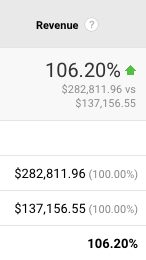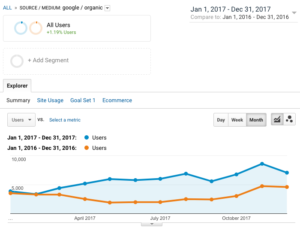Which Do You Want: Rankings, or Traffic and Conversions?
I’ve seen a lot, but one thing has never changed: SEOs and their clients obsess about rankings for high volume keywords, even though that is *clearly* not the best strategy.
I’ve never really understood that. When it was easy to go grab those rankings, we did, but the only numbers that ever mattered to me were traffic and conversions, and what it cost us to get them.
If you are ready to focus on increasing your traffic and conversions from SEO, instead of worrying about a handful of keyword rankings, this post is for you.
Stick with me here, and I’ll explain how people just like you are using nothing but Facebook ads and simple content to get more organic traffic from the search engines.
We’ve been doing this for more than 10 years now, with increasing success as search engines have changed and gotten more resistant to the old “hat color” SEO tactics.
To Get Better Results, Forget About Rankings
How successful have we been?
In a year-long test of the “Link Liberation” strategy, 31 out of 33 sites experienced growth of over 20% in traffic from organic search, and the average (!) site increased by more than 94% year over year.
Very few of those sites even tracked rankings, but those who did also saw tremendous increases in the number of #1, top 3, and page one rankings from tools like SEMRush.
But the funny thing is, none of them were actually doing anything to target individual keywords, and the higher rankings just happened naturally as part of the overall increase.
The vast majority of the participants were do-it-yourselfers, using nothing but the training and software we gave them, and spending no more than an hour or two a week managing the project.
That might not seem like much time, but it’s actually easier now because we’ve gotten better at automating the work. Heck, nowadays an extremely lazy person could probably get the job done in 1-2 hours a month.
Here’s how it works.
Case Study: Online Retail (B2C)
This website wasn’t part of the study, they started working with us later, but it’s a good example of how the system affects organic search results.
They started working with us in November 2016, and they’ve remained our client ever since.
As you can see from Analytics, we already had a noticeable increase in organic traffic from Google by March of 2017, and that gap only got bigger. Overall, their 2017 revenue from Google organic alone was more than double what they’d achieved in 2016, and Link Liberation was their entire SEO strategy.
Overall, their 2017 revenue from Google organic alone was more than double what they’d achieved in 2016, and Link Liberation was their entire SEO strategy.
All we did for them was post new content on their blog regularly, post that content on social channels, and run “engagement ads” to build an audience and drive traffic.
All the links that they got – and they have quite a few – came from simply driving traffic to their website… and because SEO doesn’t have to be a “loss leader,” they turn a tidy profit on the Facebook ads alone.
Link Liberation: SEO That Pays For Itself
The Link Liberation method is extremely simple to understand.
1. Curation: Select 15-20 pieces of content per month, from just about anywhere on the web, that your customers (and likely customers) would be interested in.
2. Social Posts: For every piece of content you select, write a short teaser to use as a link post on your Facebook Page, and space those posts out throughout the month.
3. Blog Posts: Write short summaries of 2 pieces of content each week and post them to your site’s blog, and post links and summaries to your Facebook Page.
4. Promoted Posts: Using Facebook ads, promote your social posts to an interest-based target audience on Facebook. Using a second campaign, promote your blog posts to the audience of people who engaged with your social posts. Using a third campaign, sell stuff to people who respond to your promoted posts.
That’s it. That’s the whole thing. And you can automate everything except the Curation step.
We’re working on that.
Set it up, keep it running, and you’ve already seen what the SEO impact can be. But there’s an additional benefit here, because the audience you’re building on Facebook, and the traffic that you’re driving to your site, will also generate revenue once it’s running at full speed.
What’s Next?
In my next post, I’ll explain how the Link Liberation strategy works, and why I believe it’s the easiest way to drive traffic to any online business.
Got questions? Ask!
Thanks!
Dan Thies

Leave a Reply